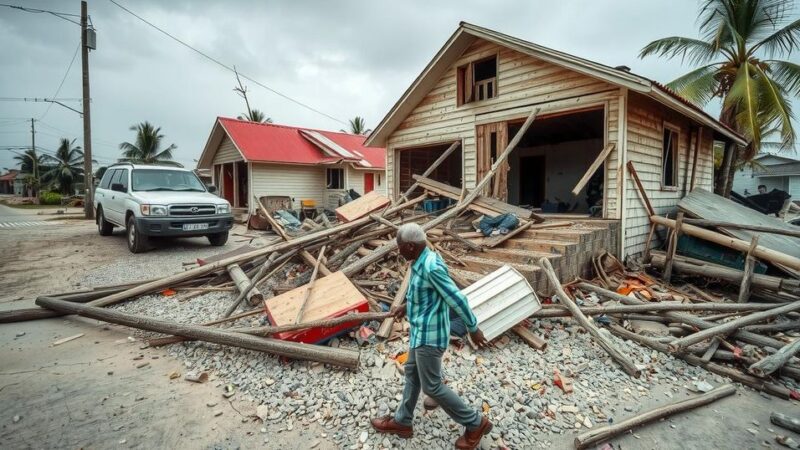Cyclone Chido, a powerful category 4 hurricane, struck Mayotte and Mozambique in December, resulting in significant destruction and population dislocation. The storm’s intensity and its occurrence early in the cyclone season are attributed to increasing ocean temperatures from climate change. Ongoing conflicts and migrations exacerbate the humanitarian crisis, underscoring the need for holistic disaster resilience strategies that consider socio-economic vulnerabilities.
Cyclone Chido, classified as a category 4 hurricane, struck Mayotte and Mozambique in December, generating wind gusts nearing 155 mph. This intense cyclone emerged early in the season, influenced by rising ocean temperatures linked to climate change. Reports indicate that approximately 70% of Mayotte’s population faced the storm’s impact, with tens of thousands of homes in Mozambique either damaged or destroyed. Compounding these effects are ongoing conflicts and undocumented migrations that exacerbate vulnerability and infrastructure damage in affected areas.
Recent studies highlight the increasing frequency of powerful tropical cyclones in the Indian Ocean due to climate change. Simulations predict further intensification of storms as global warming continues. Notably, rapid attribution studies reveal that sea surface temperatures along the storm’s trajectory were significantly higher due to climate change, with cyclone winds intensified as a result. The storms are also expected to become slower, resulting in heavier rainfall and greater flooding risks. Hence, addressing the interplay of climate change with socio-economic vulnerabilities is critical for enhancing resilience against future cyclones in regions deeply impacted by conflict and migration.
The relationship between climate change and severe weather phenomena is becoming increasingly evident, particularly in regions like the Indian Ocean that are experiencing rising temperatures. Cyclone Chido’s destruction underscores the converging crises of environmental disasters, migration, and conflict. The vulnerability of populations, particularly migrants living in precarious conditions, highlights the necessity of considering socio-economic factors alongside climate predictors when discussing disaster preparedness. As migration patterns shift due to conflict, individuals who flee to places like Mayotte add complexity to existing vulnerabilities, making them more susceptible to the impacts of such intense cyclones.
In summary, Cyclone Chido exemplifies the critical need to understand the dynamics between climate change, conflict, and migration. As these factors coexist, they intensify the effects of tropical storms, leading to devastating consequences for affected populations. To enhance future resilience, it is imperative to integrate social dynamics and climate challenges into disaster preparedness strategies. Failing to address these interconnected issues will perpetuate the vulnerabilities of displaced and migrant communities, ultimately heightening the risks associated with climate change.
Original Source: theconversation.com







